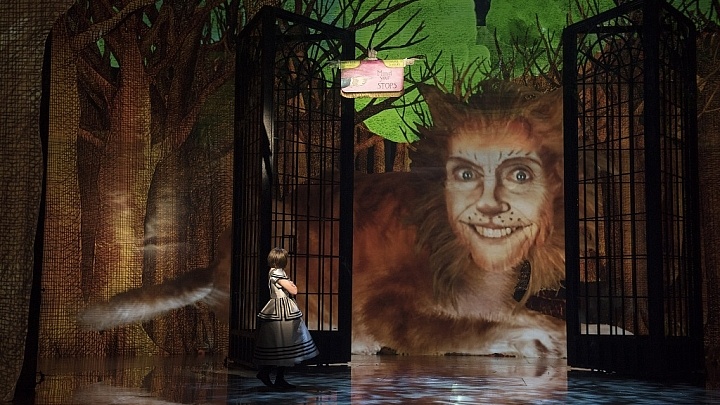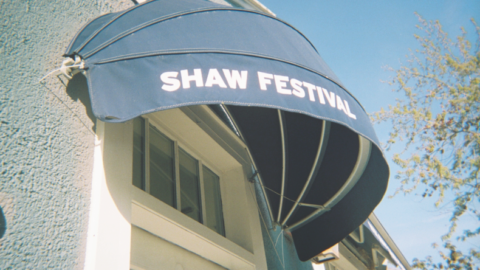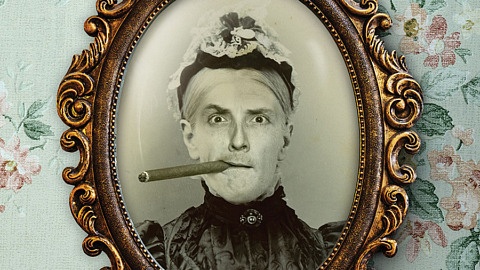Hello theatre creators, educators, scholars and everything in between! I hope you’re having a productive-yet-restful summer. Ever wonder what it’s like...
Playing at Shaw across the generations: DARTcritics meets female members of the Festival’s ensemble
By DART Critics
On August 6th we (Caroline and Sarah), had the pleasure of interviewing four astounding actresses at the Shaw Festival: Natasha Mumba, Marla McLean, Fiona Byrne, and Jennifer Phipps. Between them they represent a spectrum of experiences and generations, from Natasha, who is in her first Shaw season, to Jennifer, who performed in 30 Shaw seasons since 1967, and has appeared in more than 50 of its productions. These four talented performers agreed to meet with us and lend us their insight on what it’s like navigating the theatre industry as women, as well as how they got to where they are today! The Shaw Festival’s public relations coordinator Jenniffer Anand was incredibly generous in helping to set this up, give us access to a rehearsal hall, and invite anyone in the company to observe the conversation. Now, let’s hear what these generations of Shaw actresses had to say!
DARTcritics: Thank you all for joining us for this interview; we know how busy you all must be this season so we appreciate your time! If you could just all introduce yourselves, what shows you’re in this season, and how many seasons you’ve been with Shaw.
Natasha: My name is Natasha Mumba. This is my first season with Shaw. I’m in Alice in Wonderland and The Adventures of the Black Girl in Her Search for God.
Marla: My name is Marla McLean. It is my tenth year with Shaw and I am in Uncle Vanya.
Fiona: My name is Fiona Byrne and this is my fourteenth season… sorry, it makes me laugh. I am doing A Woman of No Importance.
Jennifer: I’m Jennifer Phipps and I’ve been here since 1967. I can’t do maths very well so you can work it out.
Marla: That’s okay, neither can we.
Jennifer: Oh good! I’m in Alice in Wonderland; I play the Cheshire Cat [David Cooper’s photograph of Phipps in this role, with Tara Rosling as Alice, is featured above—eds.].
DARTcritics: Yes, Sarah saw Alice in Wonderland, and we both saw The Adventures of the Black Girl.
Jennifer: Oh yes, she [pointing at Natasha] is wonderful isn’t she? I really mean that.
DARTcritics: What drew you all to working at the Shaw Festival?
Marla: For me it was my dance background. I studied ballet and contemporary as a young person, then I injured myself and couldn’t dance so I had to figure out what was next. I couldn’t afford to go to school so I tried putting myself out there, and ended up working with some people from here [the Shaw Festival]… I didn’t get an audition, so I wrote a smart letter and they were willing to see me on their lunch break and that’s how I ended up here.
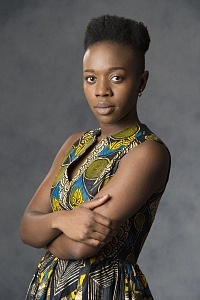
Natasha Mumba. Photo by David Cooper.
Natasha: I moved to Canada in 2010 and I went to an arts high school in Ottawa. I didn’t know what theatre was happening in Canada; I just knew I wanted to do it. I had a great teacher who introduced me to all these theatre companies and schools. In grade 12 we came here to see a show and we got to talk to the actors—I loved what I had seen and I put it in my head as something I want to be part of someday. Then the opportunity came to audition and I was here!
Fiona: I was first at the Stratford Festival, then I did a general audition for here. In high school I was more of an English student and I wasn’t interested in performing, but I had read a lot of Shaw’s plays and I absolutely loved Shaw—dork alert! So then when I actually got to theatre school [The National Theatre School] I have this memory of going around a table and everyone saying where they wanted to end up and I said I wanted to end up here. I’d come here and seen a bunch of shows and got so excited about the atmosphere and kind of work that was going on. I did a general audition and got an offer here in 1998. I wanted a small company, but one that still works in repertory.
Jennifer: Well, I’m a bit different from everyone because when I started here we only were at the Courthouse [Theatre] and there was very little theatre in Canada. Paxton Whitehead was the artistic director at the time, as Jackie Maxwell is now and as Tim Carroll will be next year. Stratford was mumbling along over there, and when Shaw Festival started we did two plays only, on the little Courthouse stage. I was just available for the roles and I was just asked to be in them. This was in 1967.
DARTcritics: Can you recall a time where you, as a female actor, faced any sort of obstacles or adversity in you career?
Fiona: Adversity in terms of, however we might define it?
DARTcritics: Yes, what ever comes to mind.
Marla: Oh sure, of course I’ll speak bluntly. In the earlier parts of my career most of my artistic directors were men, most of my directors were men—I get on well with men and I enjoy their company. I don’t know if this is generational but I had several instances where I had to, very specifically, say to a director or male actor who was of senior years than me not to speak to me in a certain way, and I have no qualms about doing that. It usually ended quite friendly and we moved on, but I certainly found at times a younger actor I had instances where I felt that there was inappropriate behaviour. Because our work is so emotionally and physically open you have to be your own advocate.
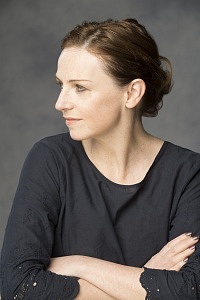
Fiona Byrne. Photo by David Cooper.
Fiona: Which is scary because there is a risk of—because you don’t have the support, you feel like if this goes awry, if I’m not listened to or respected I could possibly lose my place. It’s so competitive. You don’t have anything as a comfort or affirmation that you’ll be listened to. [In] my first professional gig ever I toured through Montreal, and the director, I remember, was very insecure. I now know looking back on it that I was the scapegoat in the room, because I was so incredibly young and eager… He made fun of me and would say ‘Oh you think you’re so great, you went to National Theatre School.’ He felt he could do this because I was a young woman, and I called him on it! I had a very strong female stage manager who was a big support for me. He never apologized in that moment but we moved on. For me to do that and to stand up for myself—as a shy person that was a big thing for me. Thank God for that stage manager; she was my advocate because I didn’t have the confidence to maintain that. I needed another woman in the room. It’s never happened since.
Natasha: I think I have been really fortunate in having a lot of people pave a way for me. I’m sitting here trying to think of a moment…. As a woman of colour a lot of ways have been paved for me to be here right now. I haven’t felt a strong front of adversity in my life. May that always be the way.
Marla: Hopefully that means we are moving forward and things are getting better.
Fiona: Jennifer Phipps, I am very curious about your response.
Jennifer: Well, I never gave myself out for labor. I mean, that was good, I suppose. I was very dim as a young girl, and a tremendous flirt… To answer your question, yes I’m sure I have had problems with that, but I can’t remember having any in Canada, and I don’t remember problems I had in England because I some how managed to cope with them probably because I am such a big flirt. When it does happen, it is generally people who are not very good at theatre. When you are a real theatre person, you get treated on the merit you present.
DARTcritics: This question is for Natasha. In The Adventures of the Black Girl… your character is met with many other characters who immediately, upon meeting her, write her off as too curious and outspoken. Can you recall a time in your career when you felt that you weren’t being heard, and how did you combat that?
Natasha: The funny thing about me is that I’ve had a very short career. I think people assume I am a very outspoken person but I do hold back a lot of things. I like to deal with things by myself because of how I was raised. It was an interesting experience going through NTS [National Theatre School] as the only black actress. I had the desire for a narrative that I could relate to and [to talk] about things that impacted me… I wish I had spoken out more about it in school. That’s something I wish I had put forward or asked for.
DARTcritics: Fiona, do you feel that your training at the National Theatre School prepared you for what it’s like to work in a professional theatre setting? Were there any classes that stood out to you?
Fiona: It did; it gave me a sense of discipline that you need as an actor. I went there at the right time for me. I was there to delve in and find out what it means to be disciplined and how to create, and be vulnerable. I was always a good student and felt the need to get it right, but that doesn’t exist in theatre. I wanted to maintain being curious, and excited, and open as opposed to presenting.
Interestingly, two of the classes that stayed with me the most I have never technically used: one was clown, which I did for six weeks and it was my favourite thing I did there. I have a real clown inside me but I haven’t done any clown work since, but for me clown has a real truth. The thing I always loved about clown was always checking in, and the whole interplay with the audience. The other class was mask, and I actually wrote a show based on my work [with mask]. It gave me confidence that I don’t even know where it came from! My character was a woman who was very pock-marked and was a florist, named Agnes. That experience has stayed with me, in putting on that mask I understood what theatre was and it opened a whole new world for me.
DARTcritics: Marla, you’ve had quite the cross-over career between musical theatre and non-musical theatre acting; do you prefer one over the other or is there one you find more challenging?
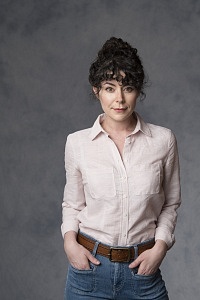
Marla McLean. Photo by David Cooper
Marla: I have found that the challenge has shifted at different points in my career. When I landed here I basically had only done musicals and I requested to understudy Saint Joan. I had so little education when it came to text work or straight plays in general. It was the only Shaw play I had read when I got here if I’m being honest…Tara Rosling was playing St. Joan [and] there were a number of heavyweights [in the cast]: Blair Williams and Pete Krantz, who had been working for Shaw Festival for a very long time. That sparked my love for text. I come from a very working-class family and the business side of this made it clear to me that I had to be able to do both [musical theatre and non-musical theatre]. So I kept asking to be considered for the straight plays while I was here, and I found it terrifying to speak on the stage for my first five years. I had real vocal trouble—I would work with this beautiful woman [referring to Victoria Heart, Shaw Festival’s Alexander Technique coach, who was present] and dialect and vocal coaches to try and center myself. As a dancer you express emotion through movement, and to try and do that with voice was terrifying. I was terrified and excited.
I’ve been lucky here; I’ve had a strange [mixture] of young ingenues, musical roles, and character roles and it’s been the best thing for me, and has since made me nervous to sing on stage. It’s about trying to find a balance throughout the work—just now, after a decade I am beginning to understand text work and to allow the text to speak for itself and not try and emote through it. Now that some of that has found its feet I want to go back to musicals and see what I can discover there.
DARTcritics: Jennifer, what has your experience been acting in a show like Alice in Wonderland and being among so many young actors? Do you feel that you are seen as a mentor to them, or that they look up to you in any way?
Jennifer: I’ve only just realized that everyone here is so young, as I’ve also just realized that I am so terribly old. I just had dinner with someone who was 90, but she’s a young spirit inside, and she has no idea of her age. You don’t think about it. There’s absolutely no difference to me working with young actors: if they’re good, it’s lovely, if not, they’ll get there. I do enjoy the curtain call [for Alice]: I come out and give her a cuddle [gesturing to Natasha Mumba]. It hasn’t struck me at all…
Fiona: Can I ask you a question about age?
Jennifer: About age itself?
Fiona: Yeah, about being a woman in this business and aging.
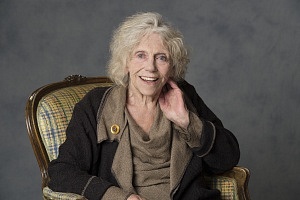
Jennifer Phipps. Photo by David Cooper.
Jennifer: Well it’s different for me because I don’t see myself… I have no idea what I look like or how I present myself. I don’t think about it. But people are very solicitous to me; when I get up it’s ‘Oh can I help you up?’ and I go ‘Oh…thank you so much.’ I can get out of a chair just fine. I say that other people make you old; we don’t make ourselves old.
When I first came to Toronto I was a Mrs. Warren [Mrs. Warren’s Profession]—it was being done by the Red Barn Theatre, a summer stock theatre that is no longer in operation. This would be about ’63. There was a friendship [in the company] of these two strong actresses: one was Mary Savage who has passed away, and I can’t remember the other one. Mary was perfectly capable and young enough to play Mrs. Warren but she wasn’t given the role because she was ‘too old.’ She was marvelous-looking. And I got [the role], and they never spoke to me. I was 30. They were so angry; it was ‘Who does she think she is?’ and ‘I could have played the role!’ etc. etc. I’ve never felt that way toward a younger actress.
Marla: You know you might not think of yourself as a mentor here, but I have been very thankful to have you on the shows I’ve been in.
Jennifer: Particularly Juno [Juno and the Paycock].
Marla: Juno was a blessing.
Jennifer: I thought you were marvellous.
Marla: Well, you are an astute, talented woman and we are very lucky to have you here.
Jennifer: I hope you tell the next guy who’s coming…
Fiona: Can I just say two quick things? When I first got here, in my second or third season, I had the great pleasure of meeting Goldie Semple, who… I just couldn’t believe I got to work with her. We did Easy Virtue by Noel Coward together, and she quickly disabused me of this thing I had about authority and treating people who were older than me with respect, and how I would want to suck any information I could out of her. She would say ‘Oh give me a break! Stop! I’m learning from you just as much as you’re learning from me!’ And I was like ‘But I’m 23 years old I don’t know what I’m talking about!’ She was doing two things: one, she was trying to make me feel comfortable, and she was also saying ‘I’m still very much in process of learning. I’m not done.’ The main thing she taught me was that we learn from those of different ages and learn and get inspired by different people. She disabused me of putting someone on a pedestal, and got me to see her as a fellow artist.
The second thing is that ever since I had children, people look at me and their eyes are different. It’s deeply respectful but it aged me immediately. I’d go to the bar and the men would go ‘The moms are here!’ Well, also just… I’m here at the bar. The dads don’t get that. It was a strange shift that happened. I don’t know if you have felt that [speaking to Marla].
Marla: I totally have! And it’s mostly from my guy friends in this company! The beautiful Patrick McManus, who is a fabulous friend and actor, he said ‘Well now that you’re a mom you’re all mouthy!’ and I said ‘No, I was always mouthy.’ I will say though—one lovely thing now that I have become a mom: I don’t give a crap. I just had a little one; he will be one year old soon.
DARTcritics: If you could take any play that’s being performed at Shaw, this season or any past season, and make it an all-female cast, which play would it be?
Natasha: I’d be curious to see Master Harold and the Boys.
Marla: Oh that’s good! You could totally do that.
Jennifer: Oh, I like it the way it is.
Fiona: My instinct is to think of something where I’ve seen a lot of masculinity, for example, Guys and Dolls [by Frank Loesser and Jo Swerling]; it would be cool to see that turned on its head.
Marla: I did [Shaw’s] The Philanderer here a couple years ago and we have phenomenal male actors here, but I did have a thought that, it would be nice to see the Philanderer as a woman. I thought that might be nice. That’s a really good question, ladies!
Jennifer: I don’t terribly approve of this.
Marla: Oh, interesting!
Jennifer: Yes, I think you forget the playwright if you do that. The playwright has written in the man for a reason and we’re doing the playwright’s work not our own work. I’m terribly sorry but, I’m not coming to see Master Harold and the Boys if it’s all women!
Natasha: Master Harold and the Girls!
Fiona: Master Harriet!
Jennifer: Mistress Harriet! Oh, what a funny title!
Fiona: We did Man and Superman [by Shaw] here and I think [the central role] could absolutely be played by a woman. It’s a person struggling with his or her coming of age and how to be ideological and live within the world… I think Ibsen and Shaw would approve of this. Ibsen always wanted people to do stuff with his plays; he wanted things changed all the time. He was always fiddling around with his own plays, and he wanted other people to fiddle with his plays. I understand having respect for the playwright but I would like to see a woman play John Tanner in Man and Superman.
DARTcritics: What advice would you give to young aspiring actors in training?
Marla: Learn the art of a good letter. It has never failed me. Send them to everyone. Also, remember that the worst thing that can happen is nothing.
Jennifer: Oh don’t ask me. I don’t know… I suppose, go to the acting schools and they’ll sort you out. I guess I can say—the real actresses, and there’s three of them sitting right here, they are not just saying the lines and looking marvelous; they go deeper than that. Give the question over to someone more clever.
Fiona: Well I’m not clever, but I will say from my time at theatre school, be able to create and find the producer in you—create your own work. Have something that you can hold onto, that’s something you created, to start you off. Also, read as many plays as you can. Classical to contemporary—stay on top of new playwrights coming in, and smaller companies. Have read them, and have gone to see [their work] before you approach them for work. Be an expert. Don’t judge certain kinds of theatre—read everything.
Natasha: Being here is such an amazing opportunity, not only for the part that I have this season, but the access I have to people’s work. People rehearsing, watching people do their understudy runs, watching people working. If anything I would give the advice that perfection isn’t a goal—I’m going to constantly be learning and it will never stop. I allow myself to learn from people and even from people who are my age. Coming out of theatre school, it’s very competitive. Allow other people to affect you, and learn from your peers instead of competing against them, which I find that is a natural instinct.
DARTcritics: We want to thank you all so much for talking to us.
Marla: Thank you!
Fiona: Yeah, great questions ladies!
Related Posts
Frances Johnson graduated from the Department of Dramatic Arts in 2020 and was about to begin an internship at the Shaw Festival when the Covid-19 pandemic...
In their final post, our team of embedders at the Shaw Festival discuss their experience sitting in on a technical rehearsal and watching the world of The...
Frances Johnson graduated from the Department of Dramatic Arts in 2020 and was about to begin an internship at the Shaw Festival when the Covid-19 pandemic...
In their final post, our team of embedders at the Shaw Festival discuss their experience sitting in on a technical rehearsal and watching the world of The...
Leave a Reply (Cancel Reply)
Twitter Feed
Blogroll
DARTcritics.com is partially funded by the Marilyn I. Walker School of Fine and Performing Arts, in support of student learning; experiential education; student professionalization; public engagement with the teaching, learning and production activities of the Department of Dramatic Arts; new ways of thinking; and the nurturing of links with our communities.

